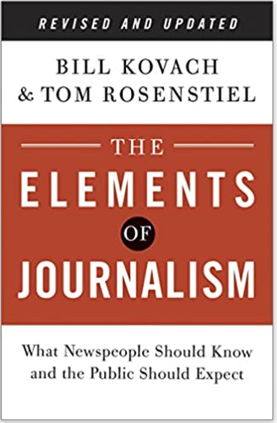Standards of Professionalism Journalism
|
The primary purpose of journalism is to provide citizens with the information they need to be free and self-governing.
"Without facts, you can’t have truth. Without truth, you can’t have trust. Without trust, we have no shared reality, no democracy, and it becomes impossible to deal with our world’s existential problems: climate, coronavirus, the battle for truth." Maria Ressa, Nobel Peace Prize lecture, Dec. 10, 2021 |
|
Journalism’s first loyalty is to citizens, loyalty that requires vigilance.
The foundation of journalism is of verification.
Journalists must maintain an independence from those they cover.
Journalists must serve as an independent monitor of power.
Journalism must provide a forum for public criticism and compromise.
Journalism must make the significant interesting and relevant.
|
Bill Kovach & Tom Rosenthiel, The Elements of Journalism; What Newspeople Should Know and the Public Should Expect.

